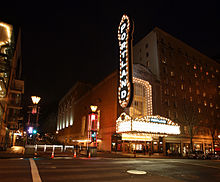Oregon Symphony Orchestra
| Oregon Symphony | |
|---|---|
| Orchestra | |

The Arlene Schnitzer Concert Hall.
|
|
| Founded | 1896 |
| Location | Portland, Oregon |
| Concert hall | Arlene Schnitzer Concert Hall |
| Principal conductor | Carlos Kalmar |
| Website | www |
The Oregon Symphony is an American orchestra based in Portland, Oregon. Founded as the Portland Symphony Society in 1896, it is the sixth oldest orchestra in the United States, and oldest in the Western United States. Its home venue is the Arlene Schnitzer Concert Hall in downtown Portland's Cultural District.
Its first concert was held at the 1,700 seat Marquam Grand Theatre on October 30, 1896, with W. H. Kinross conducting 33 performers. Included on the first program was Joseph Haydn's Surprise Symphony.
By 1899 the orchestra was performing an annual concert series (with occasional lulls), and in 1902 the first tour of the state was made. Orchestra members shared ticket revenues as a cooperative, and elected their conductors in the early years.
Royal Academy of Music trained musician Carl Denton was a major force in helping the Portland Symphony Society enter a new era. The board of directors was elected and a manager hired. Orchestra members continued to elect their conductors for the 1911/1912 season. The order of conductor and concertmaster rotation was determined by drawing lots. Musicians were from the dance and theatre orchestras of Portland. Following fourteen rehearsals, the first concert of this new-era Portland Symphony Orchestra was held at 2:30 p.m. November 12, 1911 at the newly opened Heilig Theater at SW Broadway and Taylor street. Mose Christensen conducted 54 performers in Dvorak's Symphony No. 9 in E minor and other works. Carl Denton conducted the second concert on December 17, 1911 followed by John Bayley on January 21, 1912 and Harold C. Bayley (the son of John Bayley) on March 3, 1912. Mose Christensen completed that season with the fifth concert on April 14, 1912. Harold Bayley, Carl Denton, and Mose Christensen also served as rotating concertmasters when they weren't conducting. The entire budget was made up of door receipts, which were divided equally except that the conductor received two shares. For the first concert, each musician received $1.45.
...
Wikipedia
